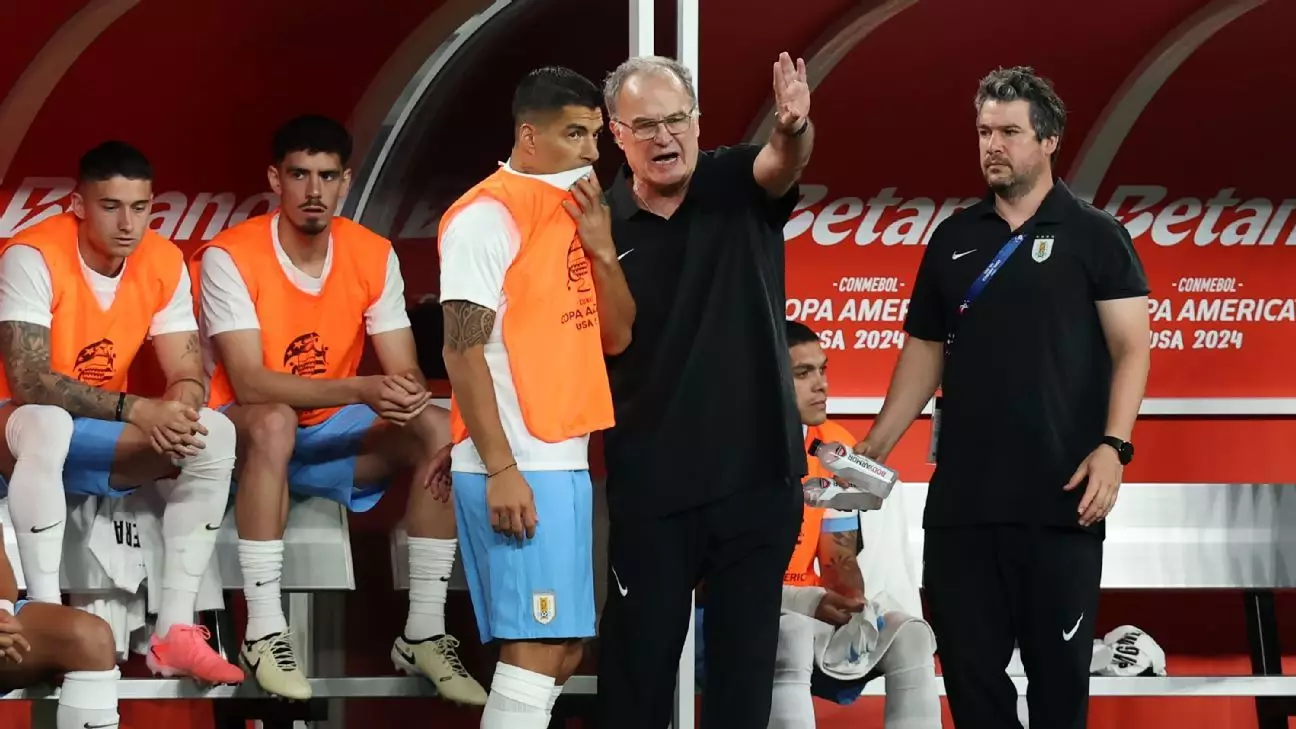In a recent revelation that has sent shockwaves through the football community, legendary striker Luis Suárez has shed light on the concerning working conditions under head coach Marcelo Bielsa during the 2024 Copa América. Suárez, who has long been a linchpin for the Uruguay national team, expressed his dismay regarding the operational environment at the Celeste Complex, which has become increasingly rigid. The revelations challenge the often opaque nature of sports team management, highlighting a rift that may have profound implications for the future of La Celeste.
Bielsa’s appointment as head coach on May 15, 2023, was seen as a watershed moment for the team, considered an overhaul that could potentially rejuvenate Uruguay’s standing in international football. However, as Suárez articulated, the fallout from Bielsa’s strict methodologies raises questions about leadership dynamics. By restricting interpersonal connections between players and staff, the ambiance of the team has turned tense and isolating, which Suárez described as heartbreaking. Employees are reportedly barred from engaging with the national team, a policy that fundamentally alters the club’s culture of camaraderie and teamwork.
Suárez’s candid remarks about the lack of communication and relational disconnect underscore deep-seated issues that can undermine any collective effort. The players expressed their discomfort through a meeting where they collectively requested a simple greeting from Bielsa—a testament to their need for respect and acknowledgment. The notion that professional athletes would have to beg for basic greetings is indicative of a leadership style that overlooks the human element in favor of strict discipline. Such a strategy may work in some contexts, but Suárez’s experiences suggest it can be counterproductive in team sports, where motivation and morale are crucial.
Despite the team’s respectable performance during the Copa América, finishing in third place, Suárez elucidated the dichotomy between success on the field and the discontent brewing in the locker room. His assertion that players felt isolated under Bielsa’s regime raises alarms about the longer-term impact on team cohesion. It seems that while results may placate some stakeholders, the morale of the players remains essential to sustainable success.
As a veteran leader with a deeply embedded history within Uruguay’s soccer narrative, Suárez’s call for fans to be more understanding points to an alarming insight: the players are not at fault for the disarray arising from the top. The complexities of Bielsa’s management style have perhaps resulted in a fractured team environment—one that Suárez warns may lead to further struggles moving forward, especially as Uruguay gears up for the 2026 World Cup.
Even after retiring on September 6 and concluding his illustrious international career as Uruguay’s all-time leading scorer, Suárez highlights that his commitment to the team transcends the pitch. Having taken the initiative to address these challenges with Bielsa directly, his experience adds weight to his words. When the coach responded with mere courteousness without addressing the core issues, it reflected a troubling mindset within the leadership.
As the national squad prepares for the upcoming qualifiers against Peru on October 11, Suárez’s insights illuminate a pressing concern for both fans and the coaching staff alike. With La Celeste currently ranking third in the Conmebol standings, there is a delicate balance between fostering a fruitful playing environment and coping with public expectations. The intersection of performance, isolation, and uncertainty looms large, as fans are encouraged to recognize that the struggles they witness may stem from fundamental issues beyond the players’ abilities.
In doing so, Suárez not only advocates for empathy but compels stakeholders to look past superficial outcomes to understand the deeper truths governing the team dynamics. The problems that plague the Uruguay national team serve as a crucial reminder of the necessity for communication and mutual respect in achieving collective success in sports. As the footballing world watches closely, the unfolding saga presents both challenges and opportunities for reconsidering how teams can best function in pursuit of greatness.


Leave a Reply